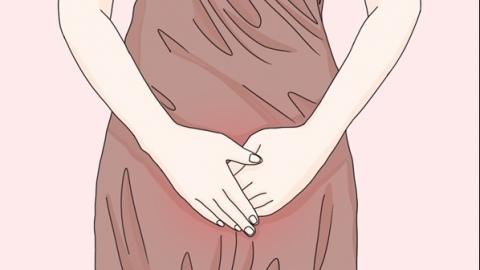What should I do if I forgot to change my sanitary pad and now feel very itchy down there?
Sanitary pads, commonly referred to as "auntie's napkin," may cause severe itching if not changed in time. This could be due to irritation from secretions, local moisture and heat, vulvovaginal candidiasis, bacterial vaginosis, or vulvitis. Symptoms can be improved through proper hygiene, keeping the area dry, and medical treatment. If itching worsens or is accompanied by odor or rashes, prompt medical attention is necessary.
1. Secretion irritation: Prolonged use of a sanitary pad allows menstrual blood and vaginal discharge to mix and accumulate, continuously irritating the skin and mucous membranes of the vulva, leading to itching. It is recommended to immediately replace the pad with a clean one, gently wash the vulva with warm water, and thoroughly dry the area to maintain dryness.
2. Local moisture and heat: Non-breathable sanitary pads that remain in place for extended periods create a moist, warm environment around the vulva, promoting bacterial growth and skin irritation, resulting in itching. It is advised to switch to breathable sanitary pads, avoid prolonged sitting, get up regularly to allow ventilation, and reduce local pressure.

3. Vulvovaginal candidiasis: Accumulated secretions promote the overgrowth of Candida (yeast), causing infection. Symptoms include intense vulvar itching and thick, curd-like vaginal discharge. Treatment under medical guidance may include antifungal medications such as clotrimazole suppositories, miconazole nitrate suppositories, or nystatin suppositories to relieve symptoms.
4. Bacterial vaginosis: Imbalance of vaginal flora leads to excessive growth of anaerobic bacteria. Discharge appears grayish-white with a fishy odor, accompanied by vulvar itching and discomfort. Under medical supervision, treatments may include metronidazole suppositories, clindamycin cream, or nitrofurantoin-nystatin vaginal soft capsules to alleviate symptoms.
5. Vulvitis: Inflammation of the vulva caused by irritation from secretions or bacteria results in redness, swelling, noticeable itching, and sometimes mild burning pain. Follow medical advice to apply medications such as erythromycin ointment, mupirocin ointment, or compound Phellodendron liquid dressing to improve symptoms.
Maintain vulvar hygiene by washing daily with warm water, choose cotton, breathable sanitary pads, change them frequently, eat a light diet avoiding spicy and irritating foods, maintain regular sleep patterns, and strengthen overall immunity.




